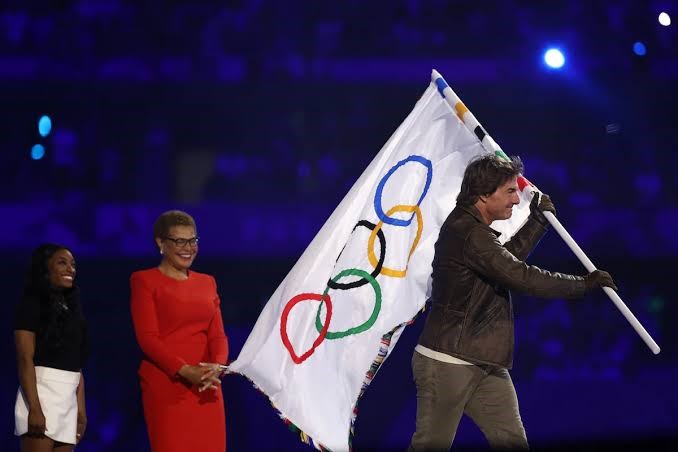
From Paris to Los Angeles: How Mayor Karen Bass and Hollywood’s Tom Cruise Are Leading LA’s Preparation for the 2028 Olympics
Fiona Nanna, ForeMedia News
8 minutes read. Updated 9:14PM GMT Mon, 12August, 2024
As the Paris 2024 Olympics draw to a close, the torch has passed to Los Angeles, which will host the Summer Games in 2028. During the Paris closing ceremony, Los Angeles Mayor Karen Bass accepted the Olympic flag before handing it over to Hollywood icon Tom Cruise. Cruise’s pre-recorded journey, which included a dramatic sequence of motorcycle, plane, and parachute, marked the official countdown to the 2028 Olympics. Los Angeles will become the third city in history to host the Games three times, following its previous Olympic stints in 1932 and 1984.
A Look Back at LA’s Olympic Legacy
Los Angeles initially secured the 2028 Olympics as a consolation prize after Paris was awarded the 2024 Games. The city first hosted the Olympics during the Great Depression in 1932, standing alone as the sole bidder. Despite the economic challenges and limited international participation, the Games featured standout performances, including American athlete Babe Didrikson Zaharias, who clinched gold medals in women’s javelin and hurdles.
The 1984 Olympics are often remembered as the “good” Olympics, leaving a lasting impact on the city and the world. The Games were notable for their innovative elements, including a jetpack-wearing performer and memorable theme music by John Williams. With a boycott from Eastern Bloc countries, the United States excelled, and athletes like Carl Lewis and Mary Lou Retton became household names. The success of the 1984 Games helped revitalize the city’s image and set a high bar for future Olympic events.
Plans for the 2028 Olympics
Looking forward, Los Angeles is planning a “no-build” Olympics, focusing on enhancing existing venues rather than constructing new ones. The opening ceremony is set to take place at SoFi Stadium in Inglewood, which will also serve as the largest Olympic swimming venue to date. The 2028 Games will feature a mix of new and historic locations, including the century-old Memorial Coliseum.
SoFi Stadium, a prominent venue since its opening in 2020, will play a central role in the Games. The Intuit Dome, the future home of the NBA’s Clippers, will be a key site for basketball, while gymnastics will be held at the Lakers’ Crypto.com Arena. The Long Beach waterfront, chosen for marathon swimming and triathlon races, will undergo scrutiny to ensure water quality, following Paris’ challenges with Seine River pollution.
Transportation and Infrastructure
Navigating Los Angeles, known for its traffic congestion, poses a unique challenge for the Olympics. Mayor Bass plans to implement strategies reminiscent of Tom Bradley’s 1984 traffic management tactics, including encouraging flexible work hours and remote work to reduce road congestion. Since the city was awarded the Olympics, there has been a focus on improving public transit infrastructure. Notable projects include the extension of a subway line to connect downtown LA with UCLA, the site of the Olympic Village, and the development of the Inglewood People Mover.
The city has secured substantial funding to enhance its transportation network, including a $900 million allocation from the Biden administration. Metro CEO Stephanie Wiggins emphasizes the importance of transforming LA’s transit system into a top choice for both locals and visitors.
Addressing Crime and Safety Concerns
As the countdown to 2028 begins, LA faces increased scrutiny over crime rates and homelessness. The Games will be classified as a national special security event, with the U.S. Secret Service leading security efforts. Despite efforts to address homelessness, it remains a significant issue, with recent developments in California prompting Governor Gavin Newsom to threaten funding cuts for cities struggling to manage encampments.
Economic and Tourism Impact
LA is positioning itself as a leading sports destination, with upcoming events including the FIFA World Cup, U.S. Women’s Open, and another Super Bowl. The city’s hotel industry has experienced growth, adding 9,000 new rooms in recent years. The LA28 organizing committee is focused on securing the necessary funds to cover the $6.9 billion budget, with over $1 billion already raised through domestic sponsorships.

